A little over an hour and a half into Michelangelo Antonioni’s Red Desert, Monica Vitti’s Giuliana visits Richard Harris’s Corrado Zeller at his hotel. “Mi fanno male i capelli” she says, her hair hurts, as do her eyes, her throat and her mouth. Roberta Torre’s Mi Fanno Male I Capelli (In The Mirror, a highlight in Cinecittà and Film at Lincoln Center’s 23rd edition of Open Roads: New Italian Cinema) with a score by Wong Kar Wai’s longtime composer Shigeru Umebayashi (2046, The Grandmaster) takes the sentence as a starting point to investigate time and the mind, memory and the fluidity of identity.
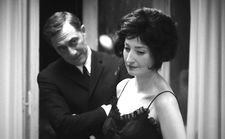 |
| Edoardo (Filippo Timi) with Monica (Alba Rohrwacher) in dress inspired by Monica Vitti’s Valentino dress in La Notte with Marcello Mastroianni and Jeanne Moreau |
In a bravura performance Alba Rohrwacher interacts not only with her newly found guiding light of identification Monica Vitti, but also with the melancholy screen Marcello Mastroianni of 1961, the Alain Delon of L’Eclisse, Claudia Cardinale, and later Alberto Sordi from Stardust. Our memories as movie audience are triggered as well, when the layers blend and the fabulous clothes by Massimo Cantini Parrini (who also did the Opening Night selection, Edoardo De Angelis’s Comandante, starring Pierfrancesco Favino, and is a Matteo Garrone favourite with Pinocchio, Tale Of Tales, and Dogman) resemble more and more those Vitti wore. Vitti’s costume test for Antonioni is brilliantly intercut with this film’s Monica (Rohrwacher) exchanging looks and garments with what she sees screened in the mirror.
When she returns from a walk on the beach she doesn’t recognise her husband Edoardo (Filippo Timi) until he puts her hands on his face. The body remembers what the mind cannot. A neurologist (Elio De Capitani) comments that “the brain forgets what it deems un-useful” and at a dinner party Monica’s senses are as acute as ever as she notices something in the air between her husband and one of the female guests. “Stop, he is not for you,” she orders, and already conjures up La Notte, the Antonioni film that serves as a kind of portal into this Monica’s melding with Vitti, the movie star.
From Sienna, Italy, Roberta Torre joined me on Zoom for an in-depth conversation on Mi Fanno Male I Capelli.
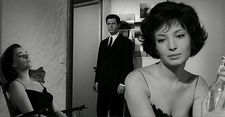 |
| Lydia (Jeanne Moreau) in Biki dress with Giovanni (Marcello Mastroianni) and Valentina (Monica Vitti) in Valentino in La Notte |
Anne-Katrin Titze: Roberta, nice to meet you!
Roberta Torre: Nice to meet you, I’m very happy!
AKT: You are in Italy?
RT: I am in Sienna, Tuscany. It’s a small city, you know it, near Florence but smaller. It’s a beautiful place in the middle of the country but very isolated.
AKT: The title of your beautiful film translates to “my hair hurts,” which is a quote from Antonioni’s Red Desert. It’s a great title in many ways and because when you think of Monica Vitti, you think of hair.
RT: Yes! The title is, as you said, about Deserto Rosso but as we are speaking about women that lose memory, it’s a journey in the mind of this woman, Monica. I thought that the hair could be like material, it’s like a piece of the body. So I think that the hair is very connected with the body, with touch, like the ideas. At the time when Antonioni’s film came out, that phrase in Italy was considered a little bit crazy. Some people laugh about this phrase in the film when Monica Vitti says it. When I heard it, I felt it was really good for my film because it’s the story of a woman that fights with her mind. Hair is just another piece of the body and for women hair is so important, it links to ideas, to happiness and sadness. So I thought it could be important to have this title for this film.
 |
| Roberta Torre on Alba Rohrwacher as Monica in Mi Fanno Male I Capelli: “ I told her to be a child, to have her acting in the film like a little girl, not like a woman.” |
AKT: It captures all of that, though in English My Hair Hurts doesn’t sound as good.
RT: I think in English the distributor has changed the title to In the Mirror; very far from the beauty of the original title.
AKT: Throughout the film we wonder how much the woman we see mirrors Monica Vitti and how much of her actual biography is in there, because Vitti had Alzheimer’s before she died. It brings up, through Alba’s performance, different ages as well as memory. I think in our head we never are only the age we are, but different ages come and go from our memory and self-perception.
RT: This is a very beautiful thought about the film! I never had this thought, but now that you are telling me this I recognise it. Because this film is even about time. The time of the young woman and the older woman and after everything is mixed the illness comes out sometimes. The older she gets, she becomes like a child. Alba played her like a child. I told her to be a child, to have her acting in the film like a little girl, not like a woman. I think this is important because when you are a child you accept everything.
And this is a very gifted situation. You can be other women, another woman, to take the memory of the bigger character, which I think we do when we go to the cinema. We try to keep the personality of the characters on the screen and to be another person for one hour and a half.
AKT: Children like to play dress up. The costumes in your film have that feel to it as well. I want to talk about Massimo Cantini Parrini, who is a fantastic costume designer in general!
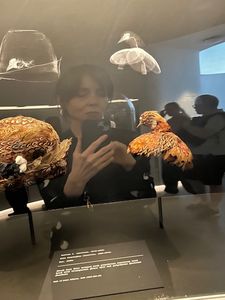 |
| Bill Cunningham bird hat in the Costume Institute’s Sleeping Beauties: Reawakening Fashion exhibit at The Metropolitan Museum of Art Photo: Anne Katrin Titze |
RT: This is important for us because the situation of the place where she keeps the dresses is like a fantastic room, a womb where she can become another. With Massimo Cantini Parrini we have thought a lot about this before making the film. We wanted not to copy, not to have a biography, a biopic, but to have inspiration from these kinds of costumes. So he went to all the beautiful costumes for Monica Vitti to see what remains today. Some dresses still remain today, for example the last one from Polvere di stelle [Stardust].
AKT: The blue one with the stars?
RT: Yes, with the stars! That’s still the real costume of Monica Vitti. Alba put it on to try and buttoned up the buttons, one after another - and it’s perfect! It was like a miracle because it was really emotional to put on this costume. Even for me. But the costume has become very very thin through time and it’s dangerous to wear. So we said we don’t want the same costume and Massimo made a lot of costumes that are inspired but not the same. Just inspired by Monica Vitti costumes. It was a beautiful journey for him and for us because he used the same textures.
AKT: Fabrics!
RT: Yes, because nowadays those are very different. It was like a journey of inspiration.
AKT: This reminds me that this year’s exhibition at the Costume Institute of The Metropolitan Museum of Art is called Sleeping Beauties: Reawakening Fashion, which is about garments in their collection that are too fragile to be worn. It fits with what you are describing.
RT: Yes, because it became like powder, she put it on and it dissolved. We said, no, no, because it was such an astonishing moment when she put on this dress.
AKT: I am just now making another connection between The Met and your film. When I spoke with the Costume Institute’s curator Andrew Bolton about another exhibition, called About Time: Fashion and Duration, we discussed Virginia Woolf and how in some of her novels the only way to tell of time passing is through the flowers on the table. In your movie you have different roses on a table and petals falling. This is a parallel, I think.
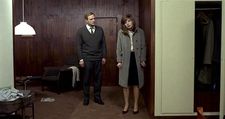 |
| Giuliana (Monica Vitti) dressed by Gitt Magrini with Corrado Zeller (Richard Harris) in Red Desert |
RT: That’s very beautiful, because the flowers are the time. And the flowers are also the feelings of the situation. Sometimes the flowers are growing and sometimes the petals are falling because nothing else can be done. Time is passing through the flowers, through the roses, the different roses. White roses, yellow roses, it’s a different feeling. As you know, flowers are a language, and for me it’s the language of time as it passes.
AKT: The moment when La Notte comes in, Marcello Mastroianni becomes part of your film, because it feels as though he interacts with Alba. It’s quite mysterious. I love the moment when she keeps saying “There’s a woman in the film, who is she?” And we wonder, does she mean Monica Vitti or Jeanne Moreau, who is neither seen nor mentioned.
RT: Yes! Even the husband who tries to keep her in the reality says, no, no, you are not there; there is a Monica Vitti there! But the confusion of the plains of reality is starting to come into their lives in that moment. So there is even a confusion between the actress - is it Monica Vitti or is it Jeanne Moreau? We don’t know. She could keep anyone! But she decides to keep Monica Vitti because Valentina in La Notte says: “It seems to me that I forget something every day.” This resounds in her mind and from that moment she begins to go in another place.
AKT: How did it all start? What gave you the idea to make this beautifully constructed mirroring mise-en-abyme of a movie?
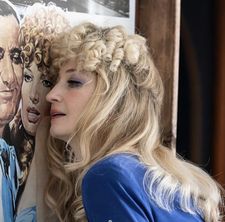 |
| Roberta Torre on Monica (Alba Rohrwacher): “She becomes a lot of women. Even if I lose my memory, she thinks, it doesn’t matter.” |
RT: I work on memory. I like to work on memory and have done so with my last two films. My previous film was called The Fabulous Ones and it was another film about memories, a journey into the memories. After that I read all the books by Monica Vitti. At a young age she says “I wanted to lose my memory.” She was very young, about 30 years old, and it seemed to me so strange that a young lady wanted to lose her memory. Afterwards I found that it was like a prophecy. Because later she moved into that situation of losing her memory.
But I recognised that for an actress losing her memory is the worst thing that could happen in reality because you can’t work anymore, you can’t memorise the script. So this fighting with memories for me was very interesting in women. I started to see her interpretation and every time I feel in her eyes something that tells me, oh here she wanted to lose memories. It’s like an obsession for me.
AKT: Also not wanting to be herself, by losing certain memories. I was at MoMA yesterday for a performance by the artist Joan Jonas and during the Q&A she said “ I never wanted to be Joan Jonas. And here I am.”
RT: Very, very true. This is the reason. To be a lot of women is the beautiful gift everyone can have. It’s the same thing that the other Monica, my Monica in the film, Alba, makes, it’s the same game. She becomes a lot of women. Even if I lose my memory, she thinks, it doesn’t matter. I have a lot of memories and I keep the memories from other women and I live their lives. It would be wonderful if we could do this.
AKT: There’s a great clip of a costume test with Monica Vitti trying on clothing and we hear the words: “Days have colours and colours have days.” This sounds like synesthesia. Did Monica Vitti have synesthesia?
 |
| Vittoria (Monica Vitti) with Piero (Alain Delon) in L’Eclisse |
RT: It’s from a test before shooting. We found it at the Museo Michelangelo Antonioni in Ferrara. The phrase you say we invented it during the shooting. It’s not written in the script but together with Alba we invented it and afterwards when I go into editing, I find that it’s wonderful. It’s perfect for the moment because she seems to go into the mirror and come out with another personality. I love the moment when she gives the coat to Monica Vitti and Monica Vitti gives the coat to her. Everything is done at that moment, like Alice Through The Looking Glass, Alice In Wonderland.
AKT: The fabulous costumes! In Red Desert, I remember, and this is true to this day, I would want every costume [designed by Gitt Magrini of Bernardo Bertolucci’s The Conformist and Last Tango In Paris, Jacques Demy’s Donkey Skin]!
RT: Every, every, every one!
AKT: Every coat! I want everything, every skirt, every shoe, every scarf, every bag.
RT: In that case, Massimo for the scene in the mirror, he remade the same skirt in the same colour, and the costumes of Monica Vitti, because they have to go together. This is the real identical costume.
AKT: Your composer Shigeru Umebayashi also worked with Wong Kar Wai on In The Mood For Love, and The Grandmaster, for example. Tell me about your work with him!
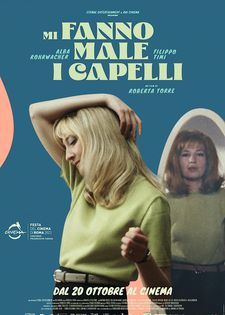 |
| Mi Fanno Male I Capelli screens in Open Roads: New Italian Cinema on June 2 |
RT: We met about 20 years ago with Ume. I made a film called Angela in 2002. I met him in Tokyo and since then we have been friends. We speak from time to time and when I was about to do this film, I called him. And he said, okay wonderful, I will do! After that he looked at all the films of Monica Vitti. All of them, but mostly the ones by Michelangelo Antonioni and by the musicians of Michelangelo Antonioni.
And when he was asked how it was to make this film, he always said it was like working with two directors together, Roberta Torre and Michelangelo Antonioni! I thought it was a joke but he told me, no it’s not a joke because I have to listen also to the music of the films of Michelangelo Antonioni and to put it all together to compose something.
He made a big big work on Italian musicians and he wanted to put together oriental soundtrack inspiration together with Italian inspiration. If you listen to the music of this film, sometimes you can find the inspiration of Antonioni. He made a very big work here. I love him from In the Mood for Love also, like everyone, and he is making another film with Wong Kar Wai after 20 years.
AKT: And there is yet another connection to The Met’s Costume Institute - China: Through the Looking Glass! [Wong Kar Wai was the Artistic Director for the exhibition] I think it’s in the stars that you have to come to New York to see the latest exhibition!
RT: Yes I want!
AKT: Thank you so much for this!
RT: Thank you! I’m very very happy to have spoken with you!
The North American première of In The Mirror (Mi Fanno Male I Capelli) will take place on Sunday, June 2 at 7:00pm - Walter Reade Theater.
The 23rd edition of Open Roads: New Italian Cinema runs through Friday, June 6.






















